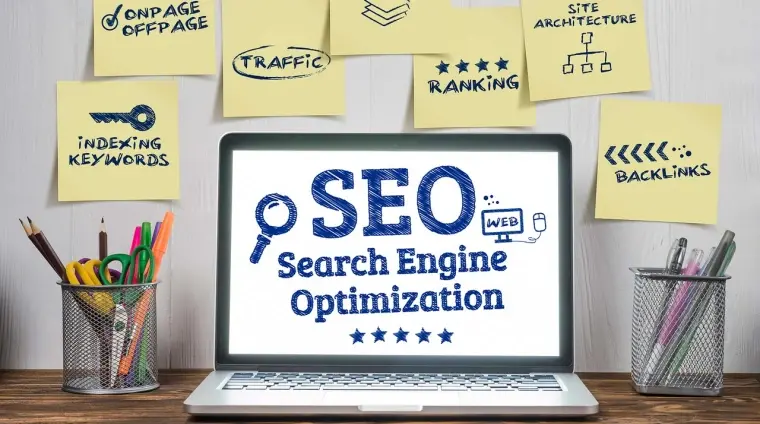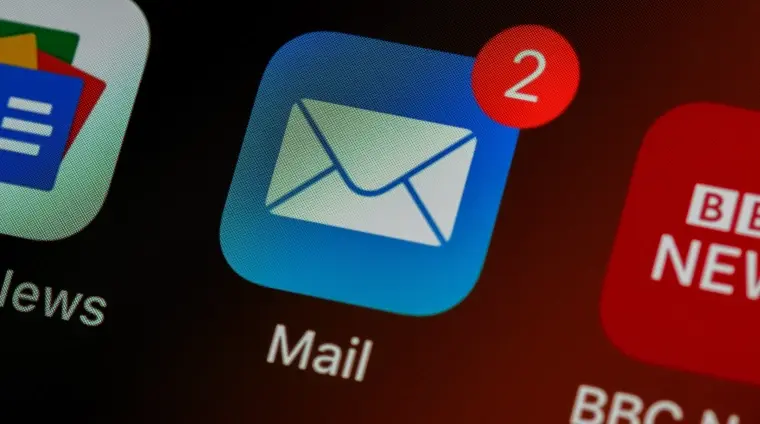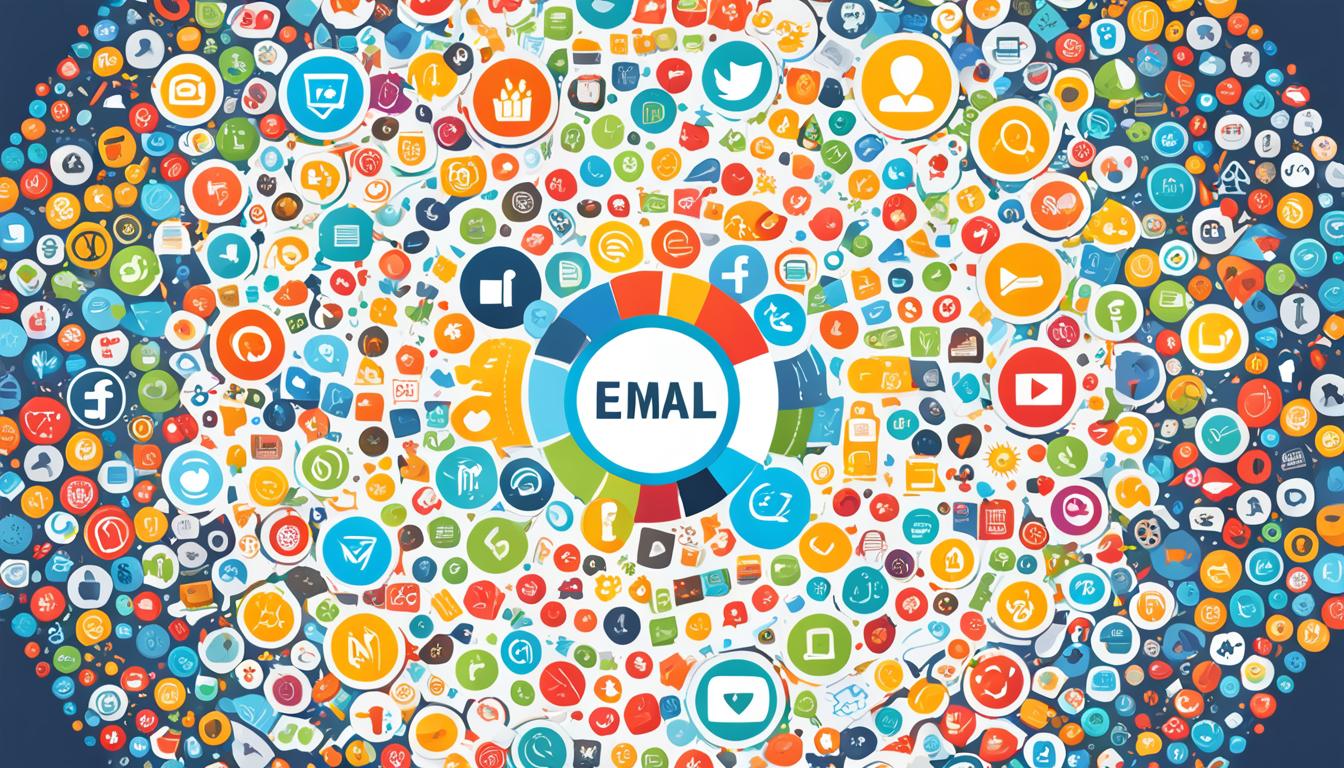Recently, a Deloitte survey found that AI in digital marketing has a $100 billion impact. But, by 2030, this may grow to $2 trillion. This shows how much trust and vision there is for AI in the future of digital marketing.
Artificial Intelligence is changing digital marketing. It helps businesses work beyond human limits, using data in smart ways and standing out from their competitors. According to Gartner, 37% of companies are already using AI. And, the number of companies using AI has shot up by 270% in just four years.
Key Takeaways
- The financial impact of AI in digital marketing is expected to reach $2 trillion by 2030.
- 37% of organizations have already implemented AI, with a 270% increase in enterprise AI adoption over the past four years.
- AI is reshaping digital marketing, enabling businesses to gain a competitive edge through innovation and enhanced customer experiences.
- Businesses are leveraging AI to liberate themselves from human work constraints and skillfully navigate the data wave.
- AI is transforming the way businesses connect with their customers, revolutionizing the digital marketing landscape.
Introduction to AI in Digital Marketing
AI is making a bigger financial impact nowadays. This is due to its use in many areas like virtual assistants and fraud detection. The IBM Global AI Adoption Index 2022 shows 35% of companies are using AI. They aim for transformation, innovation, and a competitive edge. Soon, by 2025, 95% of customer interactions will involve AI. This shows how crucial AI will be in digital marketing’s future.
AI’s Significance in the Digital Landscape
AI’s use has grown because of its various applications. It includes helping us with virtual assistants and spotting fraud. The IBM Global AI Adoption Index 2022 notes that 35% of businesses are turning to AI. They seek to improve in digital transformation, innovation, and gain a competitive edge.
AI-Powered Trends and Opportunities
By 2025, AI is expected to drive 95% of customer interactions. This shows a significant reliance on AI in different sectors. Companies see the potential in AI. They aim to use its evolving power to enhance marketing and improve customer experiences.
Artificial Intelligence and Customer Experience
Artificial Intelligence (AI) is changing how companies look at customer experience in the digital world. Big names like Home Depot, JPMorgan Chase, and Starbucks are using AI to offer better personal experiences. They know using AI can help them understand and use customer data more effectively. This lets them improve the customer’s journey.
Personalized Content and Recommendations
AI technology makes it possible to show customers content that fits their needs and likes. It looks at what customers do online, who they are, and what they like. This helps companies make ads and offers that really speak to customers. Companies like Amazon and Netflix do this very well. Smaller companies, such as sweetgreen and Stitch Fix, are also jumping on board. They’re using clever data to make unique experiences that their customers love.
Chatbots and Conversational AI
AI-powered chatbots are a big deal in online marketing. They are great because they can offer personal help, gather details that can help make leads, and keep customers happy. By 2024, experts say most people will prefer to talk to a chatbot for quick help. This shows that AI has become a key tool in making customers satisfied.
Enhancing the Customer Journey
AI helps businesses in many ways. It can save time and make content better, based on what users like. Liberty London uses it to understand what their customers are feeling and what they want. This helps them talk to customers in a way that makes sense to them. AI can also help businesses save lots of time each month. By handling small tasks, it lets employees focus on more important work, making things run smoother and keeping customers happy.
Predictive Analytics with AI
AI algorithms can dig through tons of data from social media, web analytics, and customer feedback. They provide deep insights. These insights help marketers understand their customers’ behaviors better. Marketers can then make smarter choices and create more powerful marketing plans. Plus, AI processes data in real-time. This means businesses can act fast and use data to beat their competitors online.
Understanding Consumer Behavior
Businesses use AI-powered analytics to know their customers more deeply. They learn about what customers like, how they act, and what they find most important. This info helps marketers design experiences and messages that are just right for their customers. AI also finds hidden trends in data. These trends might be tough to spot for a person. It helps businesses make smart moves and lead in their industry.
Real-time Data Processing
One big plus of AI in analytics is its real-time data crunching. This lets businesses react fast to market changes and new chances. AI is always watching data and looking for clues. It spots trends or oddities and can act on them right away. This quick, data-led strategy gives businesses an edge in the digital world.
AI-Driven Marketing Automation
AI technology is changing how digital marketing works. It lets marketers do many tasks automatically. This way, they can spend more time on planning and creating. Their marketing projects also run more smoothly and on time.
Social Media and Email Automation
With AI, posting on social media is easier. Marketers can schedule posts and see what works best with the audience. For emails, AI uses customer info to send unique messages. This makes email marketing much more successful.
Ad Targeting and Optimization
AI helps with ads on the internet, too. It looks at what people like and how they act online. Then, it shows ads to those who are most likely interested. This boosts the ads’ success and saves money by not showing them to the wrong people. Also, AI makes ads better over time. This way, marketers get more from what they spend and reach their goals faster.
Artificial Intelligence and Content Marketing
In the fast-changing world of digital marketing, Artificial Intelligence (AI) is making a big impact. It’s changing how we create content. AI tools help marketers make better blog posts, social media content, and other online content.
AI-Assisted Content Creation
With Natural Language Processing (NLP), AI can understand what people are saying online. This lets it create content that really connects with people. For example, a top marketing agency, Close, saw big improvements with AI. They did their marketing 75% better. And they made content twice as fast.
Intelligent Keyword Optimization
AI isn’t just good for search engines. It helps us speak our customers’ language. By knowing what people are looking for, AI helps create content that’s truly relevant. Close, for instance, saw their writers go from 3-4 articles monthly to almost 10 with AI.
Content Performance Analysis
AI is also great at analyzing how well content is doing. It gives marketers key information to get even better. With AI, Close published more and got more visits on their site. AI helps their content get found more on search engines too.
But using AI in content marketing isn’t without challenges. There’s a risk of losing a personal touch in what we create. To avoid this, it’s important to use AI wisely. Balancing AI’s power with human creativity is key for success in using AI for content marketing.
AI and Customer Segmentation
Artificial intelligence, with its high-tech algorithms, sorts through huge amounts of customer data. It finds hidden psychographic and behavioral patterns. These patterns are key for making accurate predictions. Using AI, businesses can come up with new customer segmentation plans. These go beyond what was possible with old-fashioned approaches.
Psychographic and Behavioral Analysis
Customer segmentation through AI may follow predefined rules or find complex customer groups on its own. This approach makes marketing more personal and effective. It meets the unique needs and preferences of specific audiences. Businesses can understand their customers better by using psychographic and behavioral analysis. They move past the limits of just using demographics.
Cluster Detection for Segmentation
AI’s cluster detection algorithms find unseen patterns in customer groups. This detailed insight helps create very focused campaigns. It makes sure the perfect message gets to the right customer at the best time. As a result, customer engagement goes up, loyalty strengthens, and there are more conversions.

Impact of AI on User Experience (UX) Design
AI has greatly changed how we design User Experiences (UX). It has changed how we create and improve digital experiences. AI tools and algorithms use data to help designers make user journeys better. This leads to more engaging and efficient designs.
Data-Driven Design Insights
AI tools are changing the way we design by providing important insights. They can look at lots of user data to find patterns and problems we didn’t see before. Designers can now make changes that are backed by evidence. This is better than just guessing.
Personalized Digital Experiences
AI makes it possible to create experiences tailored to each user. This happens because AI can predict what users will do or need. This makes the journey smoother and more satisfying for users. Companies that use this kind of personalization see users more interested and making faster decisions.
Automated Prototyping and Testing
Tasks that used to take a lot of time, like testing and creating features, can be automated with AI. Automated prototyping and testing cuts down on design time. It allows designers to try out different designs and know which ones work better. This can save up to 30% of the time it takes to design something.
The merge of AI and UX design shows how well they work together. AI’s efficiency meets the designer’s understanding of human needs. Together, they create a user experience that’s both data-backed and tailored. This helps make digital experiences that are more personal and engaging for everyone.
Challenges in Adopting AI for Digital Marketing
The power of artificial intelligence (AI) in digital marketing is clear. But, it brings challenges for businesses. These include navigating rapid advancements in AI tools, keeping customer data safe, and dealing with possible biases. Managing an AI-driven marketing team is also key.
Adapting AI for digital marketing faces the rapid pace of change. As AI-powered tools get better, businesses must also improve. This ensures their marketing stays relevant and effective. It’s hard work, requiring constant team training.
Keeping customer data private and secure is another top challenge. As AI algorithms use a lot of personal data, businesses must handle it well. They need to follow data privacy rules and earn their customers’ trust for ethical digital marketing.
Addressing potential biases in AI marketing is crucial too. Bad data can lead to unfair marketing, hurting inclusivity. To combat this, businesses should collect diverse data and check their algorithms regularly.
Training and managing an AI marketing team also pose significant challenges. Using AI tools means new ways of working. Team members have to learn to work with AI effectively. This requires ongoing training and balancing human and AI efforts.
Dealing with these challenges needs planning and always learning more. Tackling them head-on can help businesses fully use AI’s power in digital marketing. This way, they can thrive in the changing digital marketing field.
| Key Challenges in Adopting AI for Digital Marketing | Potential Impact |
|---|---|
| Adapting to Rapid Changes in AI-Powered Tools | Ongoing training and skill development for marketing teams to keep up with the latest advancements |
| Ensuring Data Privacy and Security | Robust data management protocols, compliance with evolving regulations, and building customer trust |
| Mitigating Potential Biases in AI Algorithms | Discriminatory outcomes in marketing decisions and content, undermining fairness and inclusivity |
| Effectively Training and Managing an AI-Driven Marketing Team | Integrating new skills and mindsets, balancing human and AI capabilities for successful implementation |
Facing these challenges with smart plans and continuous learning opens the door to AI’s benefits in digital marketing. It leads businesses to long-term success.
Ethical Considerations in AI Marketing
Artificial Intelligence (AI) is becoming a big part of digital marketing. It’s important to think about the effects on ethics. Marketers using AI must consider how to keep their customers’ trust and safety.
Privacy and Data Security
AI systems work with a lot of personal data, making privacy very important. Businesses using generative AI tools need to focus on data protection. They should regularly check their AI systems to find and fix any privacy issues.
Transparency and Bias Mitigation
It’s key to be open about how AI makes decisions and reduce biases. When AI algorithms aren’t clear, it’s hard for people to know how their data is used. This makes unfair marketing possible. To fix this, marketers should make sure their AI systems are transparent. This way, people can understand and control how their data is used for marketing.
Also, there are worries that AI in marketing can keep unfair biases going. Marketers need to watch out for these biases. They should make their marketing welcoming to everyone.
By focusing on these ethics, marketers can use AI well, creating a good relationship with their audience. As AI in marketing grows, keeping these ethical principles will be key for business success and customer trust.
AI and Future Trends in Digital Marketing
AI is advancing rapidly. It’s bringing new ways for marketing to connect with people. We’ll see more AI-driven immersive and augmented experiences in the digital world. This means customers will get to do more with their favorite brands in exciting, interactive ways.
Thanks to AI’s growth, we’ll also get content that feels just for us. Marketers will use AI for hyper-personalization and micro-targeting. This lets them send each person offers and content that matches their unique preferences. It’s all about making the customer’s experience better and stronger. To keep up, companies need to watch for these future trends in digital marketing. They must change their strategies to keep their place in the digital world.
Immersive and Augmented Experiences
AI coming together with Augmented Reality (AR) and Computer-Generated Imagery (CGI) opens up endless doors in marketing. It makes it possible for us to try on things virtually and see products like they’re right in front of us. This helps lower returns and build up trust with shoppers. Moreover, AR in ads makes for fun and engaging campaigns, sparking brand awareness and emotional connections.
CGI is constantly pushing the limits in marketing. It turns everyday ads into stunning, almost real works of art. These immersive and augmented experiences will get even better. With time, they’ll offer customers experiences that stick in their memory, making them feel closer to the brands they love.
Hyper-Personalization and Micro-Targeting
AI’s hyper-personalization and micro-targeting are changing the game in digital marketing. With AI, marketers can deeply understand what each customer likes and needs. This leads to content and offers that feel made just for them. As AI tools improve, micro-targeting gets to an all-time high. Now, brands can be sure they’re talking to the right people in the best way, boosting loyalty and engagement.

Integrating AI into Digital Marketing Strategies
To make AI work in digital marketing, you need a smart plan. Start by figuring out where AI can really help, like in making things personal, doing tasks automatically, or making content better. Also, it’s great for using data to predict trends.
Identifying Opportunities for AI Implementation
Finding the best spots for AI means looking at how you do marketing now. This can highlight where AI tools, for things like studying rivals, improving ads, or customizing to customers, could make a big difference.
Building an AI-Driven Marketing Team
It’s not just about finding AI chances; it’s also about having a team that can use AI well. Companies should hire experts who know AI, data, and marketing. With the right team, they can quickly get ahead in the digital marketing world driven by AI.
Organizations looking to do well in AI’s future need to match their AI plans with what they want to achieve. They also need the right people on board. With this strategy, they’re set to succeed in AI-focused digital marketing.
AI Tools and Platforms for Digital Marketers
The world of digital marketing is always changing. It has many AI-powered tools and platforms that improve how we work. These include AI-powered analytics and reporting that offer immediate insights. There are also AI-assisted content creation tools. These help in making content that is both interesting and effective.
Using these AI-powered tools can make businesses work better and faster. It helps them stand out in the competitive digital world.
AI-Powered Analytics and Reporting
AI tools help marketers understand data better. They use machine learning algorithms to find patterns and project future trends. This helps marketers tweak their strategies for better results.
Content Creation and Optimization Tools
AI-assisted content creation has changed the game. It uses natural language processing and machine learning to craft content that grabs attention. Not only is the content engaging, but content optimization tools also help make it rank better in search engines.
| AI Tool | Key Capabilities | Pricing |
|---|---|---|
| Jasper AI | AI-powered copywriting for marketing content, including landing pages, emails, and blog posts. Offers templates, font choices, and multilingual support. | Starts at $29/month |
| Surfer SEO | Analyzes search term SERPs, compares content against top-ranking pages, provides keyword research and optimization suggestions for SEO. | Starts at $59/month |
| DALL·E 3 | Customizable, brand-specific image generation for marketing materials. | Starts at $15 for 115 image credits |
| ChatGPT | Conversational AI chatbot for research, content generation, and market research purposes. | Free version available, ChatGPT Plus at $20/month |
These AI tools for marketers are key in staying ahead. They help streamline work, boost content quality, and base decisions on data.
Conclusion
Artificial Intelligence is changing digital marketing in big ways. It’s making how companies reach customers very different. This change is seen in many areas, like more personal customer experiences and smarter analytics. AI is also behind automated marketing and creating content.
With AI, companies are getting smarter. They are using it to work better, reach more people, and grow stronger. So, those who use AI in their marketing wisely are likely to do well over time. They’ll stand out in the fast-changing digital world.
The key thing to remember is AI’s role in driving major changes. It can change how customers feel. It can make marketing more efficient and help businesses grow. By using AI right, companies can keep leading in digital marketing.
FAQ
What is the significance of AI in the digital marketing landscape?
Artificial Intelligence is changing digital marketing. It’s becoming more powerful. Companies use AI to make better products, spark new ideas, and connect with customers.
AI helps businesses stand out in the digital world.
How is AI transforming digital marketing campaigns?
AI makes ads more personal and engaging. It tailors content to what people like, based on data.
This makes marketing better for users and helps boost sales.
What are the key applications of AI in digital marketing?
AI works in various areas of marketing. It powers virtual assistants, gives personalized recommendations, fights fraud, and interacts with customers through chatbots.
It’s even used in recognizing faces and images.
How does AI enhance customer segmentation and personalization?
AI makes targeting specific groups of customers better. Marketers use AI to understand what each group wants.
This helps create ads and messages that people truly care about.
What are the challenges in adopting AI for digital marketing?
Using AI in marketing comes with hurdles. Keeping up with AI’s fast changes is one challenge. So is making sure data is safe and avoiding biases. Training and managing an AI team well is also hard.
These are the main issues in blending AI with marketing.
What are the ethical considerations in using AI for digital marketing?
There are important morals to follow when using AI in marketing. Protecting customer data and being clear about how AI models make decisions are crucial. So is making sure AI doesn’t unfairly favor certain groups.
Marketers have to be careful with how they use AI.
How can businesses effectively integrate AI into their digital marketing strategies?
Companies need to be smart about where they use AI. They should pick areas where AI will really help. Building a skilled AI team is essential.
It’s also key to make AI efforts match the company’s goals well.
Source Links
- https://www.entrepreneur.com/growing-a-business/the-positive-impact-of-ai-on-digital-marketing/467334
- https://skillfloor.medium.com/the-impact-of-artificial-intelligence-on-digital-marketing-strategies-814e0181b48b
- https://medium.com/@SophiaQuantum/introduction-to-ai-in-digital-marketing-a0d1f4880bed
- https://blog.hubspot.com/marketing/ai-marketing
- https://www.optimonk.com/ai-in-digital-marketing/
- https://hbr.org/2022/03/customer-experience-in-the-age-of-ai
- https://www.zendesk.com/blog/ai-customer-experience/
- https://www.forbes.com/sites/forbestechcouncil/2021/08/11/unlocking-the-power-of-predictive-analytics-with-ai/
- https://geniusee.com/single-blog/ai-and-predictive-analytics
- https://www.optimove.com/resources/learning-center/artificial-intelligence-marketing-automation
- https://influencermarketinghub.com/ai-marketing-automation/
- https://www.salesforce.com/au/blog/ai-marketing-automation/
- https://zapier.com/blog/content-marketing-ai/
- https://blog.hubspot.com/marketing/ai-in-content-marketing
- https://www.pecan.ai/blog/ai-customer-segmentation-marketing/
- https://mailchimp.com/resources/ai-customer-segmentation/
- https://blog.hubspot.com/service/ai-for-customer-segmentation
- https://medium.com/@eduardofeo75/revolutionizing-user-experience-the-impact-of-ai-in-ux-design-623789b5150b
- https://uxplanet.org/the-impact-of-artificial-intelligence-on-user-experience-d55635c20adf
- https://www.uxdesigninstitute.com/blog/will-ai-replace-ux-designers/
- https://2stallions.com/blog/navigating-ethical-challenges-of-ai-in-digital-marketing/
- https://blog.hubspot.com/marketing/ai-challenges
- https://www.forbes.com/sites/sunshinefarzan/2023/09/29/ethics-first-the-imperative-of-responsible-ai-adoption-in-marketing/
- https://www.forbes.com/sites/elijahclark/2024/03/14/the-ethical-dilemma-of-ai-in-marketing-a-slippery-slope/
- https://sproutsocial.com/insights/ai-ethics/
- https://www.forbes.com/sites/forbesagencycouncil/2024/03/18/ai-augmented-reality-and-cgi-marketing-trends-in-2024/
- https://ortto.com/learn/ai-marketing-trends/
- https://www.singlegrain.com/blog/n/ai-in-digital-marketing/
- https://www.marketermilk.com/blog/ai-marketing-tools
- https://sproutsocial.com/insights/ai-marketing-tools/
- https://zapier.com/blog/best-ai-marketing-tools/
- https://ai100.stanford.edu/gathering-strength-gathering-storms-one-hundred-year-study-artificial-intelligence-ai100-2021-3
- https://www.eschoolnews.com/digital-learning/2024/02/05/what-is-the-conclusion-of-artificial-intelligence-in-education/















